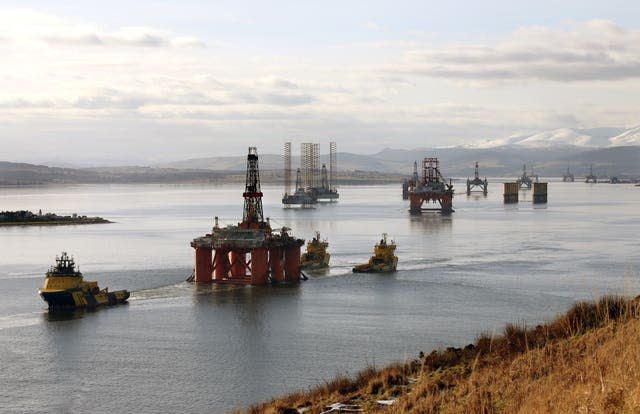No new oil and gas licences and huge boost to renewables in Labour energy plans
Labour has confirmed it will not issue new oil and gas licences for the North Sea as it sets out its plans to make the UK a “clean energy superpower”.
The party has put clean energy as one of its central missions for government as it seeks to draw dividing lines with the Tories on the climate and nature crisis, which it describes as the “greatest long-term challenge we face”.
Labour’s manifesto says the party will deliver a “green prosperity plan” to invest in the climate transition, that it claims will create 650,000 green jobs, cut bills and secure energy independence.
The manifesto confirms £8.3 billion for the publicly owned Great British Energy company which will invest in clean energy.
There are pledges to double onshore wind, triple solar power and quadruple offshore wind.
It also backs new nuclear facilities, carbon capture and storage, hydrogen and marine energy, but confirmed Labour will not issue new licences for new oil and gas fields “because they will not take a penny off bills, cannot make us energy secure, and will only accelerate the worsening climate crisis”.
But following criticism, including from the Unite union over potential loss of jobs, Labour also insisted it will not revoke existing licences and that the North Sea will be managed in a way that does not jeopardise jobs.
The clean energy plans will be part financed by closing loopholes in the windfall tax on oil and gas companies, the party said.
There is also the promised doubling of insulation and low carbon heating funding to £13.2 billion over the next parliament, along with a pledge to give Ofgem more powers to protect consumers and minimum energy efficiency standards for private rented homes.

And as Labour seeks to keep consumers onside amid a “culture war” that has been stoked in recent months over the shift to net zero, the manifesto adds: “Nobody will be forced to rip out their boiler as a result of our plans”.
Shadow energy secretary Ed Miliband said: “Labour is offering the country the most ambitious climate and energy plan in British history, investing in our country through Great British Energy, our publicly owned energy company, so we can cut energy bills for good, make our country energy secure, create good jobs, and protect our home for our children and grandchildren by tackling the climate emergency.”
Linking the climate crisis to its plans for nature, Labour has pledged to create three new national forests, plant millions of trees and new woodlands, expand habitats such as wetlands and peat bogs, reduce waste and clean up the country’s coasts, lakes and rivers.
The party has committed to the Environment Act targets on nature, clean air and water, and promised to build houses without weakening environmental standards.
Though there is a pledge to support British farmers while protecting the environment, with targets to deliver local and high standard food in the public sector, the manifesto is silent on the amount of money Labour would commit to the flagship nature-friendly farming scheme that has replaced EU subsidies.
That is likely to come in Labour’s first spending review, if it wins power.
Country Land and Business Association (CLA) president Victoria Vyvyan said there was no detail on the agricultural budget, rural growth or planning reforms.
“This manifesto suggests Labour is listening, and we welcome the manner in which they have engaged with us, but much more thinking needs to be done to deliver the serious change in business environment the countryside needs,” she warned.
Labour is also promising to work with farmers and scientists to eradicate bovine TB so it can end the “ineffective” badger cull , and to ban trail hunting – prompting criticism from the Countryside Alliance which said it could not make the move and then claim it respects the countryside”.
Countryside Alliance chief executive Tim Bonner said: “This is an unjustified and divisive attack on the rural community and one which is out of step with the public’s priorities for the countryside.”
Environmental campaigners welcomed the measures in the manifesto, but warned more needed to be done to tackle the climate crisis.
Greenpeace’s head of politics, Rebecca Newsom, said: “Despite some major gaps on nature, the party clearly recognises the huge opportunity for green jobs, warmer homes and cleaner air that the green economy presents.
“And, unlike the Tories, Labour will bring an end to climate-wrecking oil and gas and turbo-charge renewable power, delivering genuine energy security and lower bills,” she said.
But she warned “you can’t deliver real change with spare change”, and said Labour’s plan’s did not go far enough, calling for the party to tax the super-rich and polluting companies.
Mike Childs, head of policy at Friends Of The Earth added: “Economic prudence may be Labour’s guiding principle, but there’s nothing prudent about failing to invest in the measures that will safeguard our future, create clean, secure jobs in green industries, revive our ailing economy and prevent the enormous harms that await.
“It’s well beyond time for parties to stop treating climate and nature as a side issue.”
But David Whitehouse, chief executive of trade body Offshore Energies claimed an affordable net zero needed both renewables and “our homegrown oil and gas sector” and said it was concerned about the proposals to end oil and gas licences.
“We are explaining to all parties that we need the churn of new licences for a successful homegrown energy transition, to safeguard jobs and our energy security and create the investment conditions firms need to stay here in the UK.
“We also need a globally competitive tax framework based on fair returns; windfall taxes undermine this. Labour has big ambitions and we need an investment environment to match,” he urged.

 Yahoo News
Yahoo News 
